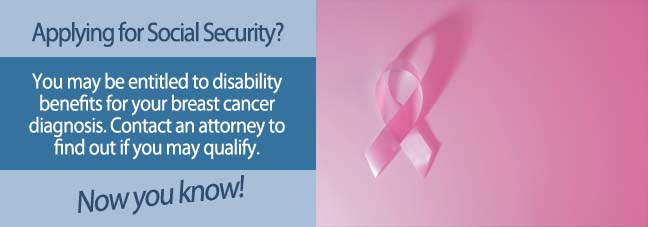Breast cancer and cancer treatments are certainly debilitating, but only treatment-resistant and advanced forms of breast cancer “automatically” qualify for disability benefits from the Social Security Administration (SSA).
If your cancer was caught early or responds to treatment, you won’t get benefits easily, but that doesn’t mean you can’t still get approved. It just means you’ll need to prove your cancer, treatments, and the residual effects of both make it impossible for you to work and earn a gainful living.
Determining if You Automatically Qualify for Benefits
Essentially, if you were diagnosed early and your breast cancer has responded to treatment, then you won’t automatically qualify, but you may still get approved for disability.
You’ll have to prove you’re eligible in other ways, including showing you’re unable to work in any job because of the residual effects of your cancer or treatments. This can be challenging and may require you to consult an attorney and file an appeal after initially being denied benefits.

As a reference, the SSA has standard disability listings that appear in its Blue Book manual. Any applicant that meets or closely matches a listed condition is qualified medically to receive disability. The breast cancer listing, which is in 13.10, requires your medical records show advanced, metastatic, or recurrent carcinoma. Small cell, or oat cell, carcinoma qualifies under this listing too, as does secondary lymphedema.
Medical Evidence and the SSA’s Requirements
Whether you meet the breast cancer listing or must prove your eligibility through further evaluations, the SSA will need to see specific evidence in your medical records before they can approve you for benefits. These records include:
- Biopsy results or pathology reports, establishing a definitive diagnosis
- Imaging scans, like MRIs, CTs, or PET scans, showing the number, location, and size of tumors
- Treatment records, including treatment type, schedule, results, and side effects
- Reports from your physician, documenting your overall condition, including any lasting physical and/or mental limitations you experience due to your breast cancer or treatments.
If your medical records don’t meet the SSA’s requirements and you must go through additional reviews to get approved, then you’ll need to show that your physical and/or mental limitations are permanent or are expected to last a year or longer.
Your doctor can help establish the anticipated duration of your disability by recording detailed notes and reports. Work closely with your physician to accomplish this, particularly if you must appeal the denial of your disability application.
Before Applying for Benefits
You’ll need to gather other records necessary for filing your claim. These include bank statements, your most recent income tax return, and the names, addresses, and other contact details for all of your healthcare providers. Review the SSA’s disability starter kit for further information, and be sure to complete the Medical and Job Worksheet, which will be required during your application for benefits.
Before applying, you’ll want to review the breast cancer disability listing and ask your doctor to do the same. If your medical records aren’t a precise match to the listing, then you’ll want to seek counsel from your doctor and possibly a disability advocate or attorney.
The better prepared you are from the start, the less likely you are to be denied benefits. If you receive a denial notice, then having your doctor and an attorney on board can greatly increase your chances of approval during appeals.